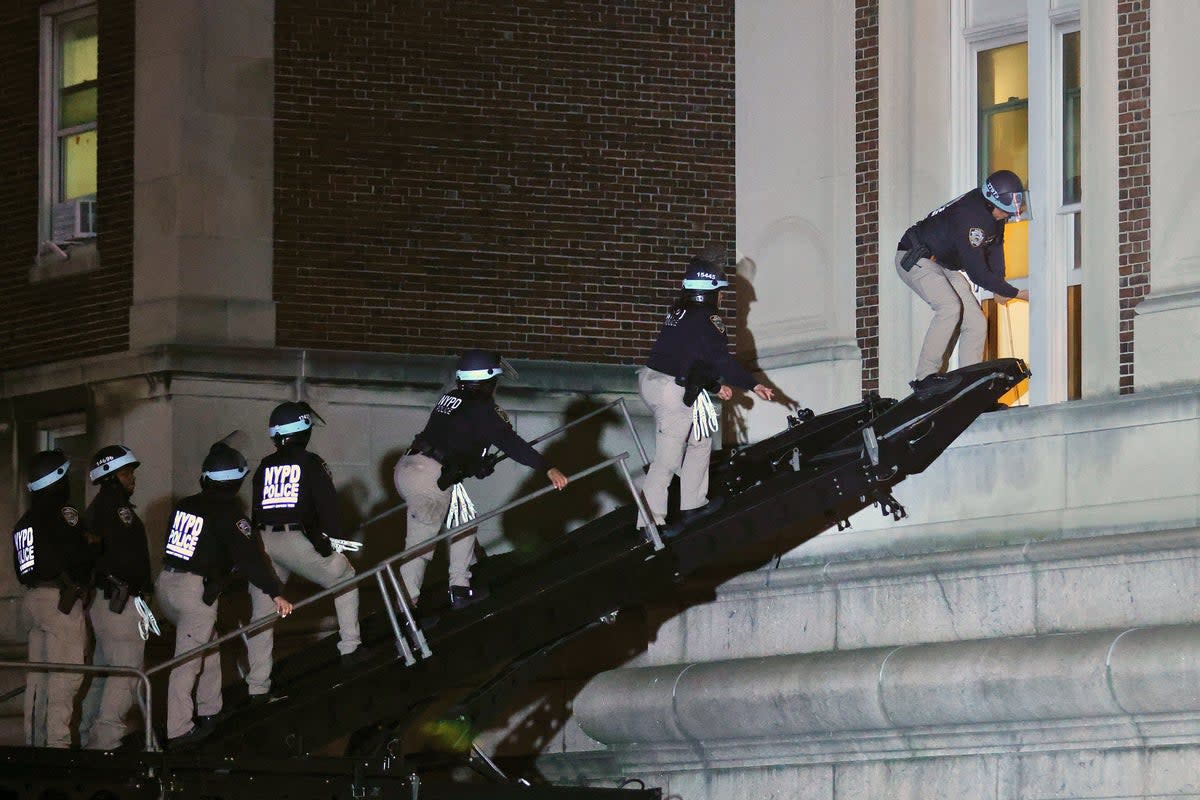What Democrats and Republicans say about campus protests after dramatic crackdowns

- Oops!Something went wrong.Please try again later.
- Oops!Something went wrong.Please try again later.
- Oops!Something went wrong.Please try again later.
In his opening remarks on Wednesday, Senate Minority Leader Mitch McConnell excoriated campus protesters across the country. McConnell said President Joe Biden “refuses to render an unqualified rejection of campus antisemitism” and called Biden’s words about the protests so far “mealy-mouthed equivocation.”
Senate Majority Leader Chuck Schumer, a native of New York and the highest-ranking Jewish elected official, notably did not say anything about the crackdowns in his home town as riot police arrested students at Columbia University. University officials said they had had no choice but to bring in authorities after students took over Hamilton Hall, an academic building which protesters began to refer to as Hind Hall.
The silence from Schumer stands in contrast to his gabby persona. Indeed, the late Bob Dole once joked that the most dangerous place in Washington was between the New York Democrat and a microphone.
In March, Schumer’s decision to call for new elections in Israel was intended, he said, to express how many Jewish Americans feel about Netanyahu’s actions in Gaza.
Schumer’s silence, contrasted with McConnell’s thundering condemnation, reflects the predicament Democrats face when it comes to campus protests. Particularly in Democratic cities and universities, where numerous students identify as left-leaning, the party feels it is in a difficult position. Meanwhile, Republicans see a clear opportunity to win over public opinion.
Republicans in the House had hoped on Tuesday to turn up the heat on Democrats, with House Speaker Mike Johnson holding a press conference with multiple chairmen and chairwomen. They aimed — and still aim — to pass legislation from Representative Mike Lawler that would require the Department of Education to use the International Holocaust Remembrance Alliance’s definition of antisemitism to enforce anti-discrimination laws. Lawler represents a district in New York that voted for Biden. Passing such legislation would have needled Democratic progressives and given an endangered Republican a public win.
Some progressives worried about taking on that definition, specifically because they worried it would equate any criticism of Israel with antisemitism.
“It is dangerous to actual policing of antisemitism, because it conflates criticisms of Israel with the definition of antisemitism,” Representative Alexandria Ocasio-Cortez of New York told me, when I asked her about the law on Tuesday. “And I also think it's dangerous on free speech grounds as well.”
By Wednesday, in the aftermath of violent arrests and demonstrations across the country, Senate Democrats — who are always more measured than their House counterparts — had become far more skittish on the issue.
Senator Elizabeth Warren of Massachusetts, who previously served as a professor at Harvard Law School, gave a noncommittal answer when I asked her about it a day after I spoke to AOC.
“Our college campuses are places where people debate important ideas,” she told The Independent. “The debate must remain nonviolent and not interfere with the ability of other students to do their work and attend their classes and make it home at night.”
Senator Tim Kaine of Virginia, who is up for re-election, also said simply, “It’s a very hard thing.”
This came as students at Virginia Commonwealth University in Kaine’s hometown of Richmond established an encampment and faced arrests from police in riot gear.
“People have very intense emotions about Israel and Gaza, as they should,” Kaine told The Independent. “They need to express them in a way that doesn’t violate universal university policies. And I think university presidents and their campus police departments are generally able to make that decision [about whether such policies have been violated].”
Senate Majority Whip Dick Durbin, the first Democratic Senator to call for a ceasefire between Israel and Gaza, said that Northwestern University in his home state of Illinois should offer a positive example. There, protesters reached an agreement with the university where it would set up an advisory committee on university investments.
Of course, not all Democrats were in accord. Senator John Fetterman of Pennsylvania, the most vocal supporter of Israel’s military campaign in Gaza, said of demonstrators at Columbia, “There is the pro-Hamas and then there's the really pro-Hamas involved.” The implication, of course, was that all demonstrators have sympathies with the terrorist group Hamas.
Conversely, Republicans seemed to relish in the moment. Senator Josh Hawley of Missouri — the same Senator who pumped his fists at Trump supporters on January 6 before rioters breached the US Capitol — said the US National Guard should be called in to college campuses.
“The National Guard, what they ought to do is they ought to safeguard the Jewish Americans,” he said, before comparing the moment in history to when President Dwight Eisenhower sent the US National Guard to Little Rock, Arkansas during the desegregation of a high school.
“I just think their priorities are misplaced,” Hawley added. “It should be easy to say Jewish Americans should be safe on campus.”
Senator Lindsey Graham of South Carolina also said he thinks that the federal government needs to take action.
“I think we need to restore order,” he said. “And if you're a Jewish student at one of these campuses, you're under threat. That needs to end.”
The dichotomy in rhetoric between Senate Democrats and Republicans shows how Republicans see the chaos of the protests as an opportunity to criticize Democrats about law and order. Meanwhile, surveys have shown that Democratic voters overall disapprove of Biden’s steadfast support for Israel, perhaps explaining Democrats’ reticence to comment strongly either way.

